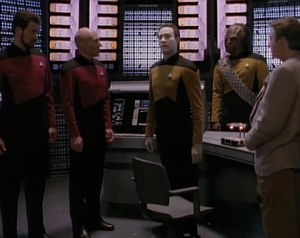| |||||||||||
| |||||||||||
|
Spoiler-free notes: The cinematography is brighter, crisper, and more colorful this season. The special effects also seem to have gotten a slight upgrade, in addition to the tweaked opening credit sequence. Now that she's gone, I can report that Dr. Pulaski didn't annoy me as much as I had expected her to. Still, it's nice to have Dr. Crusher back. Data mentions that it's been nearly a century since there's been a ship-wide breakdown of any Starfleet vessel's computer systems, but isn't that what happened to the Yamato in "Contagion"? Dr. Stubbs repeats a common misconception when he asks Dr. Crusher how many viruses she's killed. By definition, viruses are not technically living organisms. You have Dr. Crusher worried that her son isn't growing up normally--that he's way too uptight for a teenager--and then you have Dr. Stubbs, a man so driven and obsessed that he's become a self-important jerk willing to risk everyone's lives in order to finish his experiment. These stories are not mutually exclusive. Dr. Stubbs is an example of what could happen to Wesley if he stays on the path he's on. This is a good episode for Wesley's growth as a character, showing how much more mature the writers are in working with him. He's come a long way since the first season. With the nanites "evolving" so quickly (I would posit that it's not true evolution, but I won't get into it), it seems pretty dangerous to give them an entire planet. How long before they become a rapidly expanding machine race hell-bent on using the rest of the galaxy as raw material? The ending of this episode is a little too neat, not just in terms of how quickly the plot resolves itself, but in how little the entire thing seems to have affected Wesley. Given that the story is all about Wesley, it seems strange that he wouldn't be given an opportunity within the confines of the narrative to reflect on the ramifications of his mistake. After all, he nearly killed over a thousand people by pushing himself too hard. Instead of dealing with that, the closing scene focuses on Dr. Crusher, which makes for a cute, feel-good coda that fails to really address the central problem in a meaningful way. When this episode first aired, it was my first exposure to the concept of nanotechnology. It seems weird, since practically everybody knows about it now, but back in the late 1980's, this was groundbreaking subject matter for mainstream science-fiction. It's good to get back to having scientific concepts at the core of the show, since far too many episodes in season two opted for relationship drama and wacky situations over science. | |||||||||||
|
| |||||||||||
| |||||||||||
|
Copyright ©2011 e. magill. All rights reserved.
|

